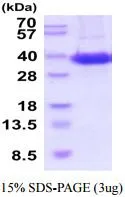
3 μg of GTX67157-pro Human Sodium/Potassium ATPase beta 1 protein (active) by SDS-PAGE under reducing condition and visualized by coomassie blue stain
Human Sodium/Potassium ATPase beta 1 protein, His tag (active)
GTX67157-PRO
ApplicationsFunctional Assay
Product group Proteins / Signaling Molecules
Protein IDP05026
Overview
- SupplierGeneTex
- Product NameHuman Sodium/Potassium ATPase beta 1 protein, His tag (active)
- Delivery Days Customer9
- Application Supplier NoteSpecific activity is > 3000 pmol/min/microg, and is defined as the amount of enzyme that hydrolyze 1.0 pmole of Adenosine 5-triphosphate to phosphate per minute per minute at pH 7.5 at 25C.
- ApplicationsFunctional Assay
- CertificationResearch Use Only
- Concentration0.5 mg/ml
- ConjugateUnconjugated
- Gene ID481
- Target nameATP1B1
- Target descriptionATPase Na+/K+ transporting subunit beta 1
- Target synonymsATP1B, sodium/potassium-transporting ATPase subunit beta-1, ATPase, Na+/K+ transporting, beta 1 polypeptide, Beta 1-subunit of Na(+),K(+)-ATPase, Na, K-ATPase beta-1 polypeptide, adenosinetriphosphatase, sodium pump subunit beta-1, sodium-potassium ATPase subunit beta 1 (non-catalytic), sodium/potassium-dependent ATPase beta-1 subunit, sodium/potassium-transporting ATPase beta-1 chain
- Protein IDP05026
- Protein NameSodium/potassium-transporting ATPase subunit beta-1
- Scientific DescriptionThe protein encoded by this gene belongs to the family of Na+/K+ and H+/K+ ATPases beta chain proteins, and to the subfamily of Na+/K+ -ATPases. Na+/K+ -ATPase is an integral membrane protein responsible for establishing and maintaining the electrochemical gradients of Na and K ions across the plasma membrane. These gradients are essential for osmoregulation, for sodium-coupled transport of a variety of organic and inorganic molecules, and for electrical excitability of nerve and muscle. This enzyme is composed of two subunits, a large catalytic subunit (alpha) and a smaller glycoprotein subunit (beta). The beta subunit regulates, through assembly of alpha/beta heterodimers, the number of sodium pumps transported to the plasma membrane. The glycoprotein subunit of Na+/K+ -ATPase is encoded by multiple genes. This gene encodes a beta 1 subunit. Alternatively spliced transcript variants encoding different isoforms have been described, but their biological validity is not known. [provided by RefSeq, Mar 2010]
- Storage Instruction-20°C or -80°C,2°C to 8°C
- UNSPSC41116100
- SpeciesHuman


